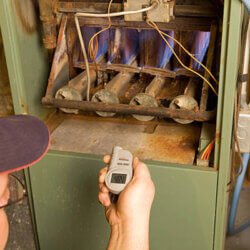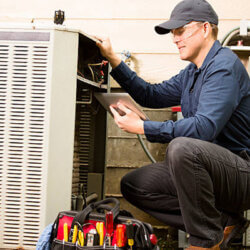
Realizing there is something wrong with your HVAC system can be a scary moment. If you do not know much about HVAC troubleshooting, relatively simple issues can seem a lot more serious than they are. Not only will the following HVAC troubleshooting tips help you avoid that moment of panic when something goes wrong, they can help you save money on HVAC costs and keep your HVAC system in good working order.
Contact Galmiche & Sons to schedule an appointment for heating & air conditioning maintenance today!
HVAC Troubleshooting Tips

- Do This First if Heat Won’t Come On: Perhaps the easiest bit of HVAC troubleshooting you can do is to first check the power source when your heat won’t turn on. A blown fuse or tripped circuit breaker is often the issue with electric-based systems. For gas heaters, make sure to check your gas is turned on at the meter before assuming it is an issue with the heater.
- Check for Thermostat Issues: Thermostat issues are similarly easy to overlook, but they can cause a lot of mayhem. From malfunctioning electronics in your thermostat to bad programming, it is much easier to fix or replace a thermostat than other HVAC equipment. Make sure your thermostat is not too close to heat-producing appliances as well, as these can also throw off its ability to sense the accurate temperature.
- Fix Leaks & Gaps: This is a bit of HVAC troubleshooting that your HVAC technician can help you with. If you see visible leaks in your ductwork, you can repair the rip with metallic foil tape. For smaller leaks and sealing issues though, a professional assessment is sometimes worth the cost.
- Check Refrigerant Levels: Low refrigerant levels are most often associated with air conditioner malfunction, but it is an issue that can affect your heat too if you are using a heat pump. In fact, it is one of the more common heat pump problems that people face and an easy HVAC troubleshooting task to check. Make sure to have low refrigerant levels addressed by a professional as this can indicate a potentially dangerous and costly refrigerant leak.
- Clean Vents & Ductwork: This is another underrated HVAC troubleshooting tip. Wiping down the registers (or vents) for your air ducts prevents the build-up of grime, which can cause more serious issues down the road. Similarly, dirty vents will block proper airflow, damage HVAC components, and spread irritants through your home.
- Replace Air Filters Often: On this note, replacing your air filters often helps to keep your ducts and the air that flows through them clean. One bit of HVAC troubleshooting that almost anyone can do is checking to make sure your air filters are not too dirty and replacing them if they are.
- Clean Evaporator Coils: Do you see a common theme to these HVAC troubleshooting tips? It may seem simplistic, but keeping your HVAC system clean goes a long way towards keeping it working. Dirty AC coils can stop working, leading to a costly replacement. For the evaporator coil, one risk of too much grime is that the coil can freeze, interrupting HVAC function and potentially damaging other components as well.
- Check Condenser Coils: Again, it is always a good idea to have these components cleaned during your next maintenance check. If you notice your AC never seems to cycle off, checking your condenser coils is a good first step for HVAC troubleshooting.
- Remove Condensate Drain Clogs: Finally, if you notice water pooling around your unit, you can do some HVAC troubleshooting by checking for a clog in your condensate drain line. The drain pan should have very little water in it. If there is a lot, or it is overflowing, you likely have a clog.
Get More HVAC Troubleshooting Information
For most of these HVAC troubleshooting tips, you will need a professional’s help to address the issue once you have assessed it. There is a lot you can do on your own though, from sealing duct leaks to replacing air filters. Knowing how these different components of your heating & air conditioning system work can help you avoid higher repair and maintenance costs while keeping your HVAC system working smoothly all year round. To learn more or schedule professional HVAC service in St. Louis, contact us at Galmiche & Sons today.









